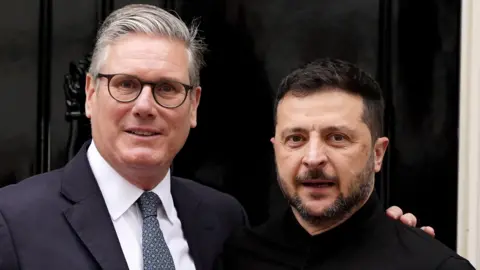In recent political discussions surrounding the ongoing conflict in Ukraine, Sir Keir Starmer has positioned himself as a pragmatic leader, balancing public support and private negotiations. As the political landscape evolves, particularly with meetings on the horizon involving Ukrainian President Volodymyr Zelensky and foreign leaders, Starmer’s approach has drawn attention for its nuances and calculated diplomacy.
Starmer has consistently expressed support for Ukraine and its president, voicing condemnation towards Russian President Vladimir Putin. His public rhetoric stresses a commitment to supporting Ukraine, a stance that resonates with the UK populace which largely backs its government’s support for Kyiv. However, behind the scenes, there appears to be a more complex strategy at play. Starmer’s critics suggest that his carefully measured words offer a stark contrast to his more candid private thoughts on the negotiations and peace processes, implying an ambition to convey both strong leadership and diplomatic tact in an unpredictable international environment.
The backdrop of these negotiations is significant, especially with the imminent meeting between President Trump and President Putin occurring in Alaska. This moment has stirred apprehension among UK ministers, who have approached the situation with caution, opting for a diplomatic stance rather than adopting the harsh rhetoric typical of former UK Prime Minister Boris Johnson, who once characterized similar meetings as “the most vomit-inducing episode in all the tawdry history of international diplomacy.”
Many within Westminster are wary of the repercussions that may arise from the Alaska summit. Speculation suggests that the UK government has begun to cautiously embrace a narrative of “land for peace,” indicating a potential compromise where Ukraine might cede territory to Russia as part of a peace deal. While some officials assert that this would only pertain to lands already under Russian control, it remains a complicated and painful prospect for Ukraine — a country still grappling with the ramifications of its territorial integrity being questioned.
Starmer’s government maintains that decisions about territorial concessions should ultimately rest with Ukraine. According to a British official, the unsettled questions involve three key areas: “How much land, which land, and whether it will be recognized de facto or de jure.” This condition highlights the delicate nature of the negotiations, where territory could be viewed as belonging to Russia effectively due to military control, or be legally acknowledged as Russian-held land — adding layers of complexity to already tense discussions.
As Starmer and other European allies prepare for a mass visit to the White House to engage with President Zelensky, they outline two primary goals for their involvement in these discussions. First, they aim to encourage Zelensky to listen carefully to Trump’s proposals, especially considering the emotional remnants of previous contentious interactions last February in the Oval Office. Second, they seek to solidify what could be construed as “ironclad” security guarantees to safeguard Ukraine amidst any evolving peace deals.
Recent endorsements of proposed security measures by Trump’s envoy, Steve Witkoff, showcasing them as “game changing,” are viewed as affirmation that Starmer and French president Emmanuel Macron’s collaborative efforts are gaining traction. This situation reflects an unexpected consolidation of political will, countering earlier skepticism regarding the feasibility of such agreements.
Starmer’s relationship with both Trump and Zelensky provides him a distinct advantage as he strives to serve as a diplomatic bridge connecting European leaders and the U.S. administration. With his recent remarks emphasizing the necessity for a fair and sustainable peace, Starmer remains optimistic yet cautious regarding Trump’s contributions. There is an understanding among UK officials that President Trump is determined to exercise his capabilities to broker a deal — a move that could potentially reshape the current geopolitical dynamics if executed efficiently.
Ultimately, Keir Starmer’s strategic approach, balancing democratic support for Ukraine with a willingness to engage in pragmatic negotiations, reflects a calculated method of navigating the troubled waters of international diplomacy during one of the most challenging periods for Ukraine’s sovereignty.











